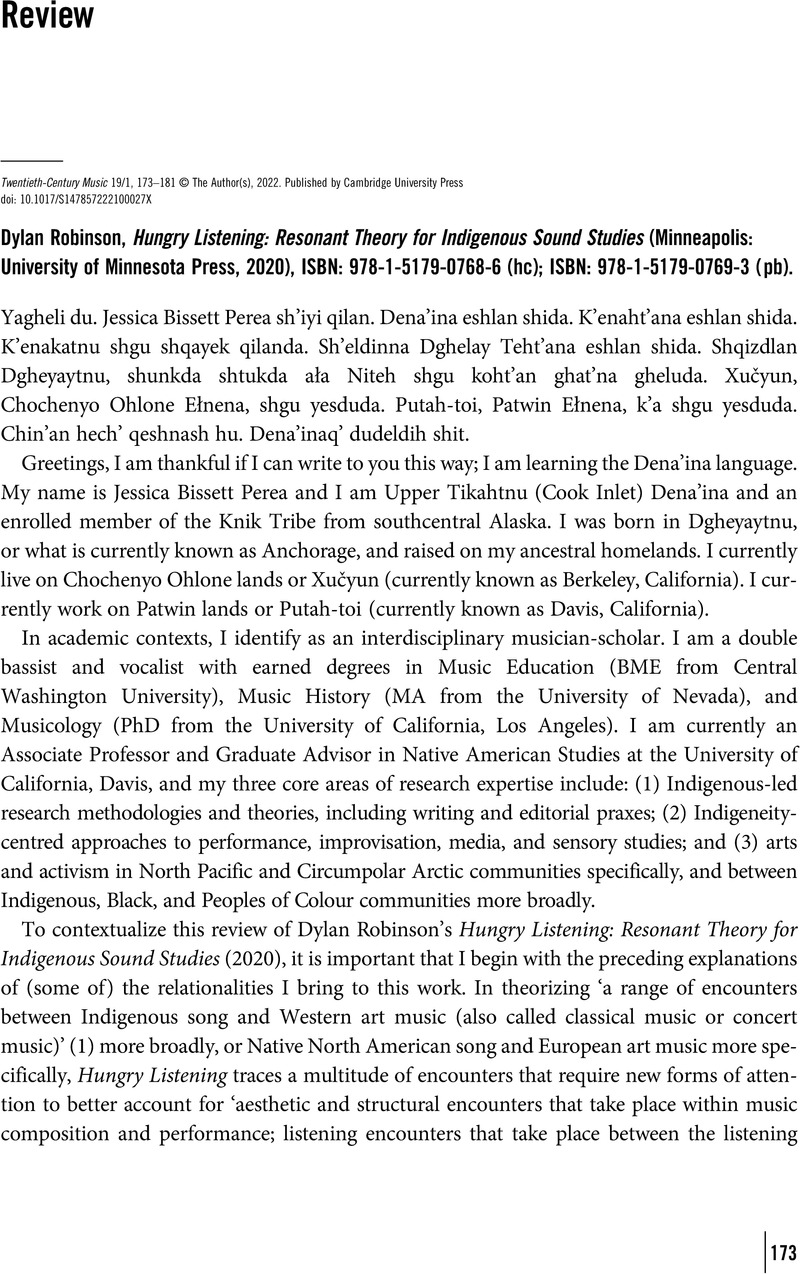No CrossRef data available.
Article contents
Dylan Robinson, Hungry Listening: Resonant Theory for Indigenous Sound Studies (Minneapolis: University of Minnesota Press, 2020), ISBN: 978-1-5179-0768-6 (hc); ISBN: 978-1-5179-0769-3 (pb).
Published online by Cambridge University Press: 18 January 2022
Abstract

- Type
- Review
- Information
- Copyright
- Copyright © The Author(s), 2022. Published by Cambridge University Press
References
1 Perea, Jessica Bissett and Solis, Gabriel, ‘Asking the Indigeneity Question of American Music Studies’, Journal of the Society for American Music (special issue: Music, Indigeneity, and Colonialism in the Americas) 13/4 (2019), 401–10CrossRefGoogle Scholar.
2 Lipsitz, George, ‘Improvised Listening: Opening Statements Listening to the Lambs’, in The Improvisation Studies Reader: Spontaneous Acts, ed. Heble, Ajay and Caines, Rebecca (Routledge, 2014), 9–16Google Scholar.
3 For one recent example, read about Lauren Peters (Unangax̂) and her journey to rematriate her aunt: Karen Nikos Rose, ‘Native Girl's Remains Returned to Alaska After More than a Century’, UCDavis, 30 August 2021, www.ucdavis.edu/curiosity/news/uc-davis-family-rematriates-their-ancestor-alaska-native-school.
4 Martin, Keavy and Robinson, Dylan, eds., Arts of Engagement: Taking Aesthetic Action In and Beyond the Truth and Reconciliation Commission of Canada (Waterloo, Ontario: Wilfrid Laurier University Press, 2016)Google Scholar.
5 Kauanui, J. Kēhaulani, ‘“A Structure, Not an Event’: Settler Colonialism and Enduring Indigeneity’, Lateral 5/1 (Spring 2016)CrossRefGoogle Scholar.
6 I am riffing here on science education scholars Douglas L. Medin and Megan Bang's explanation of science as ‘Eurocentric ethnoscience’. See Medin, and Bang, , Who's Asking? Native Science, Western Science, and Science Education (Cambridge, MA: MIT Press, 2014), 15CrossRefGoogle Scholar.
7 Archibald, Jo-Ann, Indigenous Storywork: Educating the Heart, Mind, Body, and Spirit (Vancouver, BC: UBC Press, 2008)Google Scholar; Smith, Linda Tuhiwai, Decolonizing Methodologies Research and Indigenous Peoples, 3rd edn (London: Zed Books, 2021; 1st edn published 1999)CrossRefGoogle Scholar; Vizenor, Gerald Robert, Manifest Manners: Postindian Warriors of Survivance (Hanover, NH: University Press of New England, 1994)Google Scholar; Vizenor, Gerald Robert, Survivance: Narratives of Native Presence (Lincoln, NE: University of Nebraska Press, 2008)Google Scholar.





